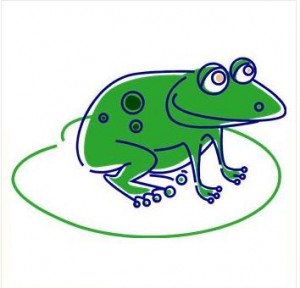 A frog lived in a shallow well. It said to a turtle that was passing by, “I am so happy! When I go out, I jump about on the railing beside the mouth of the well. When I come home, I rest in the holes on the broken wall of the well. If I jump into the water, it comes up to my armpits and holds up my cheeks. If I walk in the mud, it covers up my feet. I look around at the wriggly worms, crabs and tadpoles, and none of them can compare with me. Moreover, I am lord of this trough of water and I stand up tall in this shallow well. My happiness is full. My dear sir, why don’t you come often and look around my place?”
A frog lived in a shallow well. It said to a turtle that was passing by, “I am so happy! When I go out, I jump about on the railing beside the mouth of the well. When I come home, I rest in the holes on the broken wall of the well. If I jump into the water, it comes up to my armpits and holds up my cheeks. If I walk in the mud, it covers up my feet. I look around at the wriggly worms, crabs and tadpoles, and none of them can compare with me. Moreover, I am lord of this trough of water and I stand up tall in this shallow well. My happiness is full. My dear sir, why don’t you come often and look around my place?”
Before the turtle from the East Sea could get its left foot in the well, its right knee got stuck. It hesitated and retreated. The turtle told the frog about the East Sea.
“Even a distance of a thousand li cannot give you an idea of the sea’s width; even a height of a thousand ren cannot give you an idea of its depth. In the time of King Yu, there were floods nine years out of ten, but the waters in the sea did not increase. ln the time of King Tang there were droughts seven years out of eight, but the waters in the sea did not decrease. The sea does not change along with the passage of time and its level does not rise or fall according to the amount of rain that falls. The greatest happiness is to live in the East Sea.”
After listening to these words, the frog of the shallow well was shocked into realization of his own insignificance and felt humbled.
Are we like the frog in the well? We spend our lives using a fraction of the consciousness available to us. Little do we realize that our conscious experience can be vastly enlarged. Through this expanded consciousness we can realize that the universe that we now think as vast and magnificent is just the tip of the iceberg. Why wallow in a shallow well when the vastness of the ocean beckons?
“The frog in the well” is an ancient Chinese fable. You can find this and other such fables here.


